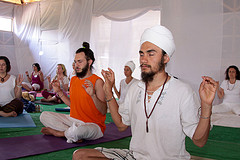Guyside: Do you have recovery time covered in your exercise?
Yoga. How hard can that be, right? Just a bunch women accessorizing and lying around on mats, right?
Uh-uh. As I type this, my large thigh muscles are complaining, and my abdominal muscles are providing harmony vocals. All this after an “ambitious” session of Kundalini yoga on Monday. As in so many instances, my pain is my fault, for two reasons:
- I have had a fairly indolent fall, with not nearly the same level of activity — yoga or otherwise — that I might expect normally.
- Being reasonably competitive and interested in seeing what others were doing in the class, I wanted to show that I wasn’t some Kundalini newbie. So I pushed myself.
And here I sit, waiting for my muscles to stop being mad at me.
Time was that such foolhardiness on my part wouldn’t have been NEARLY as big a deal. Gluttony, sudden spurts of exercise, alcoholic overindulgence, nights with very little sleep — it all was part of the game, and I (or at least I think) was able to perform quite fine under all sorts of self-imposed constraints. Now, it’s a different story. I can have late nights, but there will be a price to pay. The days of 80-chicken-wing sprees accompanied by pitchers of beer? Gone. And as my yoga experience has shown me (not for the first time), I need to gauge my level of effort when exercising and prepare for recovery time.
And it’s not just me. Science says so. An article in the Encyclopedia of Sports Medicine and Science states baldly that “The recommended dose of exercise should do no more than leave the participant pleasantly tired on the following day. Recovery processes proceed slowly, and vigorous training should thus be pursued on alternate days.” And a Harvard Men’s Health Watch article points out (too late for me this time) that it’s best to “Work yourself back into shape gradually after a layoff, particularly after illness or injury.”
This week, I brought my bike in from the garage to set it up for winter training. If I have learned one thing from Monday’s yoga class, it’s that while I can do stuff, I can do stuff better if I do it with an eye to gently bringing myself up to speed, rather than exploding out of the gate.
And the benefits of physical activity are so great and diverse that there’s no argument against moving a bit more. Now, can someone pass the Ben-Gay?
Photo: cc-licenced image from Flickr user Jamie Ramos.
Read MoreGuyside: Being a good man without being a dad
I’m not a father. It’s not gonna happen. It’s not a question of “waiting for the right woman” — I found her over 20 years ago, and that’s that — or of some unfortunate biological malfunction. When my partner and I were together a while, we started to talk about children, and we decided together that we would not have any. And quite a number of years ago, we took permanent steps to ensure that we weren’t going to have children.
First off, there’s the sensitivities that any man sometimes feels about being around kids. You find yourself, at times, in strange situations. A few years ago, friends — let’s call them Dick and Jane — separated. My partner and I were at Jane’s house for dinner, and their daughter “Kate” asked if we could go to her track meet the next day. I could, so I showed up at a school field the next morning, wandering around looking for Kate or Jane. I saw Kate first, and she ran over to hug me, and as she competed, I took some pictures. Then I realized that I was just a random guy with no “real” ties to this event, taking pictures of children. And I also realized that she needed the support of people there rooting for her, and I was proud to do it.
Guyside: What is it that power does again?
Oh yes. Corrupts.
Up here in Canada, people of a certain age and persuasion have been bathed in utter sordidness for the last week, as one of the stories I wrote about last week — that of national radio host Jian Ghomeshi — has gotten worse, and worse, and then worse again.
To recap: Ghomeshi was the host of a nationally-broadcast show on CBC Radio (and on 180 or so NPR stations in the US), a regular contributor to the CBC’s national TV newscast, and a host of a number of high-profile cultural events. He was the personification of an organization seeking a younger, hipper demographic. About a week ago, it was suddenly announced that he was taking an indefinite leave. The immediate assumption was that he was taking time to deal with his father’s recent death.
But by Sunday, he’d written a 1600-word Facebook post that said he was fired, and fired because of revelations of his private sexual behaviour (what he described as being “adventurous in the bedroom”) made by a jilted ex-girlfriend. By now, he’s been the subject of allegations of both workplace sexual harassment and of assaultive behaviour with women in his life, some of whom remain anonymous and some of whom have gone public. His career is in tatters, he’s gone to ground, a Toronto police investigation is underway, his former employer has launched a major inquiry, and a national conversation has begun, thanks to the Twitter hashtag #beenrapedneverreported.
So this is about power. If the allegations against Ghomeshi are true, it seems clear that his power as a media personality allowed him to behave in a reprehensible way with little fear of being “called out” for it. In fact, one producer on his radio show who reported harassing behaviour was allegedly told “he’ll never change, so what can you do to make the workplace less toxic?” by the show’s executive producer.
So here’s the thing. If you are a man who is abusive of women, a sexual harasser, not much I will say here will resonate. But I’ll simply say STOP. Stop what you’re doing. But if you’re not, if you’re horrified by the thought that women are dry-humped in the workplace, that a male colleague would whisper in a female colleague’s ear “I want to hate-f*** you,” etc.: then you’re with me. We need to stop tolerating this in our fellow men. We need to be the sunlight that disinfects the places we work and live to ensure that EVERYone can work and live without fear of assault; we need to be willing to make noise.
If there’s something that this whole tawdry story has taught — or can teach — men, it’s that THIS IS NOT JUST A WOMEN’S PROBLEM. And as I edge toward being a “senior” person in contexts, I’ve realized that while whatever power I possess can corrupt, it can also disinfect, if I have the courage to use it. Who’s with me?
Read More
Guyside: dispatches from the men’s foxhole
It’s been a weird seven days up here in Canada. Last Wednesday, a man appeared at our national war memorial and shot to death one of the ceremonial guards, then made his way to our House of Commons (think Congress), was pinned down by security, then shot and killed by our Sergeant-at-Arms. This happened while essentially all of our elected representatives were having weekly caucus meetings within a few metres of where the shooter was stopped. That attack came on the heels of an incident where two soldiers at a shopping mall were run down in the parking lot. One of those soldiers died of his injuries.
Then on Friday, a very high-profile national radio host (think Terry Gross level) named Jian Ghomeshi announced he was taking a leave from his show Q. By Sunday night, his employer, CBC had announced he was fired, allegations of sexual misbehaviour were flying, he published a 1600-word post on Facebook explaining that yes, he was given to BDSM-type behaviour in the bedroom and that this was all the product of a jilted girlfriend, and he was filing a $55-million lawsuit against his employer. Meanwhile, an utter typhoon of drastically divided opinion swirled.
On Monday, a Member of Parliament wrote another note on Facebook (since removed) alleging that an unnamed prominent political reporter had tried to coerce a Hill staffer into sexual improprieties by blackmailing her with embarrassing information that was released when she didn’t accede to his demands.
And yesterday, a video was released of a woman walking the streets of Manhattan to what seemed to be a neverending stream of catcalls and inappropriate come-ons. When I posted the video on my Facebook profile and asked how it resonated with women I knew, the results were not surprising but utterly disheartening — more than a dozen had stories to tell of truly creepy encounters, starting with “hey baby” and escalating to things that would freak me out if they happened to me.
What’s all this have in common? They all revolve around perceptions and expectations of masculinity.
Parliamentary Sergeant-at-Arms Kevin Vickers was widely hailed as a hero for his sangfroid and dignity during and after the shooting incident. The Ghomeshi and unnamed reporter stories highlighted the perception — and the reality — that men in powerful positions are often able to engage in heinous behaviour with little consequence. And the “catcall video” is a vivid demonstration that reality for women is utterly different than for me.
This stuff isn’t “women’s problems” — it’s OUR problem as men, and beyond being a good man myself, I just don’t know how to make a contribution to fixing these problems.
Read MoreGuyside: the power of ritual
 I’ve mentioned in a previous Guyside that my mother died in August. And yesterday, my brother and I were informed that her house — our house — had sold. For me, it’s been an odd experience. It’s a home my grandfather built in the ‘teens and twenties in a small coal-mining town. My mom and her siblings grew up in that house; after getting married, my dad moved in, and my two brothers and I grew up there. Soon, I’ll be flying home (an ironic phrase, now) to do the final paperwork and hand off the house to its new owner.
I’ve mentioned in a previous Guyside that my mother died in August. And yesterday, my brother and I were informed that her house — our house — had sold. For me, it’s been an odd experience. It’s a home my grandfather built in the ‘teens and twenties in a small coal-mining town. My mom and her siblings grew up in that house; after getting married, my dad moved in, and my two brothers and I grew up there. Soon, I’ll be flying home (an ironic phrase, now) to do the final paperwork and hand off the house to its new owner.
A crying shame?
I recently picked up the telephone to a shocking call. A friend had been terminated at his job, and was calling to let me know not to use his work-issued mobile phone or email address.
It was shocking for a couple of reasons. First, even as I head towards 50, I am still naive enough to think that competent, “good” people are never fired. Second, it was only one of a very few occasions on which I can remember my friend choking up.
We men tend to be far less likely to cry than women. A report from the American Psychiatric Association in February suggests that women cry about five times as much as men.
Some point to hormonal differences in men and women as one reason for this difference in teariness.
And others point to the childhood socialization men receive. There’s a reason that the band 10cc had a big hit with their song “I’m not in love” with its iconic “Big boys don’t cry” spoken line. It resonated. And still does.
I’m not much of a crier. I’m more of the occasional leaker. I haven’t had the proverbial “good cry” since my mother’s death earlier this year. I did have one of those after my father died in 2012. But beyond that, I’m more of the person who wipes a tear away, often inspired by a moving performance of a song, than the person who sobs or needs a wad of tissues.








